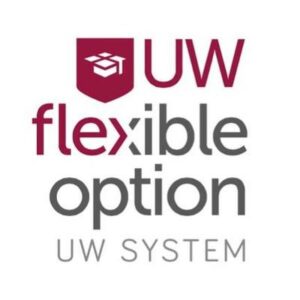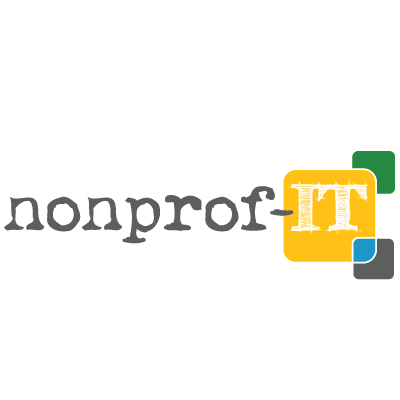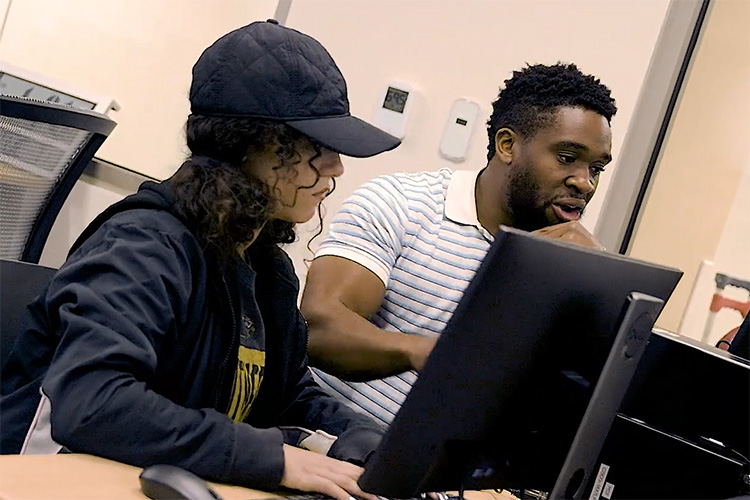Information Science and Technology, BS BS
Our Information Science and Technology (IST) major combines core IT skills like front-end web design, programming and project management with electives that you choose. The only degree of its kind in the UW System, the IST degree will prepare you to be a leader in the IT industry.
Building on a general undergraduate education, the IST program immerses students in information science, information architecture, human factors in information seeking and use, information organization, storage and retrieval, and applications of the internet. This degree prepares graduates to be IT leaders in our increasingly digital culture and economy.
Program Type
Major
Program Format
Hybrid, On Campus, Online
Where will the IST degree take you?
An IST degree has no boundaries! From building online solutions for nonprofit organizations to securing and maintaining IT networks in corporations such as Northwestern Mutual, Rockwell Automation & Acuity, IST students and graduates are building the information and technology systems that people depend on today and envisioning the innovations of tomorrow.
IST Program Options at a Glance
Major, minor, double-major, plus certificates! The flexible nature of the IST degree curriculum will allow you to customize your program by developing a focused area of study or by choosing a minor or certificate in another field. Students wishing to pursue a certificate or minor in another field are encouraged to make this decision early in their program, and speak to their academic advisor to plan their course of study.
The IST program is also a great choice for transfer students. Whether you are an associate degree holder from a UW System university, a technical college IT associate degree holder, or changing your major, our advising staff will assist you with transferring credits to maximize the work you’ve already completed.
Internships and Experiential Learning
Becoming a leader in IT means immersing yourself in the tools, technologies and experiences of the profession. Milwaukee is home to major employers, innovative startups, Fortune 500 companies and an ever-growing technology landscape. The city is an extension of the classroom, and many opportunities exist to gain real-world experience through internships as well as experiential learning opportunities such as the nonprof-IT program.

The Bachelor of Science in Information Science and Technology —offered in the UW Flexible Option—is designed to help you achieve your goals, on your schedule, and on your budget. As a competency-based program, you will build on your existing IT knowledge and skills.
IST Degree Requirements
The IST program includes a total of 120 (minimum) credits distributed in the following areas:
General Education Requirements
General Education Requirements, or GERs, are frequently offered broad-based courses that all students need to take to earn a UWM degree. General Education Competency Requirements should be completed early in the academic career. The GER areas needed to complete the IST degree include:
Competency Requirements:
- Oral and Written Communication (OWC) Competency
- OWC Part A
- OWC Part B
- Quantitative Literacy (QL) Competency
- QL Part A
- QL Part B
- Foreign Language Requirement
UWM Distribution Requirements
- Arts
- Humanities
- Natural Sciences
- Social Sciences
- Cultural Diversity
Complete details on General Education Requirements can be found online at: https://catalog.uwm.edu/policies/undergraduate-policies/#generaleducationtext
The following 9 courses (30 credits) are required:
- INFOST 110 – Introduction to Information Science
- INFOST 240 – Web Design I
- INFOST 290 – Project Teams, Leadership and Communication
- INFOST 310 – Human Factors in Information Seeking and Use
- INFOST 315 – Knowledge Organization for Information Science & Technology
- INFOST 340 – Introduction to Systems Analysis
- INFOST 350 – Introduction to Application Development
- INFOST 410 – Database Information Retrieval Systems
- INFOST 440 – Web Application Development
- INFOST 490 – Senior Capstone
Choose 5 additional Information Studies courses at the 300, 400 or 600 level.
Examples of such classes are:
- INFOST 320: Web Design II
- INFOST 325: Information Security I
- INFOST 370: Data Analysis and Visualization for the Information Professional
- INFOST 375: Multimedia Web Design
- INFOST 383: Native Mobile Applications
- INFOST 385: Information Security II
- INFOST 465: Legal Aspects of Information Products and Services
- INFOST 491: Advanced Topics (Responsive UI Design; Oracle Academy Database Design & Programming w/SQL; Information Architecture)
- INFOST 695: Ethical Hacking I
- INFOST 697: Cisco Routing and Switching I
Contact your advisor for additional course options.
Cross-functional electives help students become more well-rounded IT professionals. Choose a 3 credit course from each of the five following disciplines:
- Business (3 credits)
- Communication (3 credits)
- Technical Arts (3 credits)
- Philosophy/Psychology (3 credits)
Advisors are available to assist with the selection of general electives, including additional areas of study that are appropriate to your career goals, and to complete the 120 total credit requirements for the IST degree.
Choosing your electives wisely and careful planning will allow you to complement your IST degree with additional certificates, study abroad experiences, minors and/or a double major – building on the strong core foundation within the IST program, often without adding additional time to degree.
Examples of programs that pair nicely with the IST major include:
Certificate Program Options
- Certificate in Health Care Informatics
- Digital Arts & Culture Certificate
- Web Development Certificate
Minor Options
- Art
- Computer Science
- Communication
- General Business
- Global Studies
- Journalism & Mass Communication
- Health Care Administration
- International Studies
For a complete list of UWM minors visit: https://uwm.edu/academics/?_program_type=minor
Enhance your coursework
Expand your knowledge beyond the classroom through internships, independent study programs, and study abroad opportunities.
Employers look for students who have real-world experience – an internship is a great way to get your foot in the door. The internship course (INFOST 495) is designed to provide IST students with practical experience. It is intended for students who have not had previous work experience in professional information technology settings. In order for the internship to count towards IST Upper Division Elective credits, the student must enroll in INFOST 495 (3 cr.). The student must complete 12 credits in the IST major prior to beginning the internship.
It is the responsibility of the student to identify and secure a site for an internship. At the same time, the student needs to meet with a faculty advisor who will ensure that the internship meets the work and academic learning requirements to count for 3 credits.
Internship Placement Application & Evaluation Forms
Please complete the Internship Placement Application and Evaluation Forms found here: wwwdev.uwm.edu/informationstudies/students/faqs-forms-and-policies/fieldwork-and-internship-forms/#ist-internship
Experiential learning
Consider participating in an internship with the SOIS nonprof-IT program:

Gain real-world experience, work with teams, provide technology solutions, and develop a passion for service. Learn more about the SOIS nonprof-IT program>>
An independent study provides the student with an opportunity to pursue a project or research topic under the guidance of a SOIS faculty member. In order for an independent study to count towards IST Upper Division Elective credits, the student must enroll in INFOST 399 (1-3 cr.).
The student must first design a proposed action of study. Prior to registering for INFOST 399, the student must meet with a faculty member who will oversee the independent study and discuss the proposed independent study. The faculty member and student will establish a written contract detailing objectives, plan of action and means of evaluation. The student is expected to assume primary responsibility for learning – the faculty member is a facilitator in helping to arrange learning opportunities.
International Experiences and Study Abroad programs provide an experience that will enhance a student’s education personally, professionally, and socially. For information on international programs organized by SOIS, please visit our International Experiences & Study Abroad Opportunities page
Learn more about the Study Abroad programs offered by UWM
uwm.edu/cie/study-abroad/
An IST degree has no boundaries!
Information science and technology students and graduates are building the information and technology systems people depend on today and imagining the innovations of tomorrow.

Visit our IT Career Paths webpage to learn more about careers in IT and the classes you can take to prepare you for your IT career.
Example Job Titles & Employers
| Job Title | Employer |
|---|---|
| Analytics Consultant | Northwestern Memorial Hospital – Chicago, IL |
| Solutions Developer | Omni Resources – Milwaukee, WI |
| Interactive Web Developer | FRED Agency – Atlanta, GA |
| Adversarial Security Testing Engineer | Northwestern Mutual – Milwaukee, WI |
| UX Product Manager | Cisco – Seattle, WA |
| Information Security Analyst | Jockey International – Gurnee, IL |
| Software Engineer | Charles Schwab – Austin, TX |
| Radiology Clinical Systems Analyst | UW Health – Rockford, IL |
| Digital Experience Consultant | Aflac – Columbus, GA |
| Data Analyst | HealthEquity – Milwaukee, WI |
| Solutions Engineer | VMware – Milwaukee, WI |
IT Careers – Median National Salary Ranges
| OCCUPATION | 2022 MEDIAN NATIONAL PAY |
|---|---|
| Computer Network Architects | $126,900 |
| Computer Support Specialists | $59,660 |
| Computer Systems Analysts | $102,240 |
| Database Administrators and Architects | $112,120 |
| Information Security Analysts | $112,000 |
| Network and Computer Systems Administrators | $90,520 |
| Software Developers | $124,200 |
| Web Developers | $80,730 |
| Technical Writers | $79,960 |
Career Services
Our career services advisor is available to assist students with career planning and preparation. In addition to networking events and career-prep workshops, our career services advisor can provide one-on-one consultation throughout your academic program. Visit our career resources page for more information.

